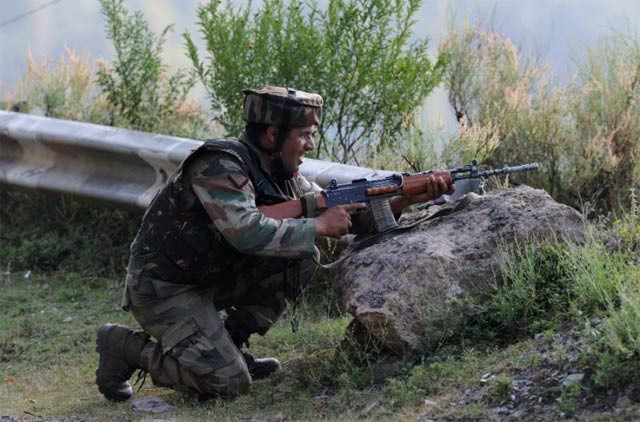Sabre-rattling aside, India unlikely to go for military adventure
Airspace restrictions imposed on Northern Areas as PAF warplanes engage in take-off and landing rehearsal

Airspace restrictions imposed on Northern Areas as PAF warplanes engage in take-off and landing rehearsal. PHOTO: AFP
Hawkish politicians and retired military officials have been calling for a military response since four gunmen killed 18 servicemen in the brazen attack on a corps headquarters in India occupied Kashmir on Sunday.
‘India will not attack Pakistan or AJK’
According to the strategic assessment of Pakistani security agencies, when it comes to making major decisions like cross-border action, “the Indians realise that if they attack Pakistan it does not play out in their favour”.
The government on Wednesday imposed ‘airspace restrictions’ and cancelled all flights to Gilgit-Baltistan. Sections of motorway near Peshawar and Lahore were also closed to traffic to allow Pakistan Air Force (PAF) fighter jets practice landing and take-off. The drill triggered speculations that the threat of possible surgical strikes or military action from India was imminent
“Although a lot is being said in the Indian media, our assessment is that there is no indication as yet that India is planning any sort of attack against Pakistan,” said a top military official, who was briefed about the latest assessment by intelligence agencies on the possibility of military showdown in the wake of the Uri attack.
Rising tensions aside, the two nations have also seen some years of relative peace along their border, a break from wars that pockmarked the 20th century. The consequences of any form of attack could be far worse than people realise on both side of the border.
“Despite jingoism and sabre-rattling, India will think twice before launching any attack against Pakistan,” the official added while speaking on the condition of anonymity. He, however, made it clear that the armed forces were on ‘high alert’ to respond to any eventuality, noting that Pakistan has the 11th biggest army in the world.
India incapable of waging war on Pakistan, experts say
A senior PAF official, while speaking on the condition of anonymity dismissed the reports that the ‘manoeuvres’ were linked to the ongoing tensions with India. “This was part of our exercises that the PAF conducts after every four years,” the official clarified. He explained that the exercises were planned much ahead of the Uri attack and said all relevant departments were informed well in advance.
Background discussions with civil and military authorities suggested that Pakistan was not expecting an immediate threat from India. The Indian reluctance to go for the military option stemmed from the fear of an all-out war between the two countries.
A highly placed Pakistan official, who is regularly consulted by the government on security matters, said that India was not strategically prepared to launch a military attack on Pakistan because it would get a ‘befitting and matching’ response to any ‘adventure’. “We don’t want any escalation. And let’s hope better sense prevails on the other side as well,” the official said.
This is not the first time that India considered the military option to retaliate against major terrorist attacks that it alleged was masterminded from Pakistan.
In a first sign that the threat of an immediate military showdown has receded, Indian Foreign Secretary Subrahmanyam Jaishankar summoned Pakistan’s High Commissioner Abdul Basit to remind him of Pakistan’s public commitment in 2004 not to allow its territory to be used against India for cross-border terrorism.
The India foreign secretary also said that New Delhi was ready to provide all the details and evidence regarding the Uri attack if Pakistan was willing to investigate. The development suggested that India has opted for a diplomatic option despite initial rhetoric of taking a military route.
Indian military asks govt to consider 'punitive' cross-border strikes
Meanwhile, air link between Northern Areas and the rest of the country remained suspended on Wednesday as no flight could land or take off from the region.
At least one flight each to Skardu and Gilgit was scheduled on Wednesday. Similarly, a flight to Chitral was also suspended, leaving dozens of passengers stranded at airports.
PIA spokesperson Danyal Gilani attributed the cancellations to “airspace restrictions”. “Due to Northern Areas airspace restrictions, PIA’s September 21 flights to Gilgit, Skardu and Chitral have been cancelled. Inconvenience is regretted.” Gilani said in one of his tweets on Wednesday.
He said all flights to Gilgit, Skardu and Chitral in the Gilgit-Baltistan region were cancelled.
Published in The Express Tribune, September 22nd, 2016.



















COMMENTS
Comments are moderated and generally will be posted if they are on-topic and not abusive.
For more information, please see our Comments FAQ